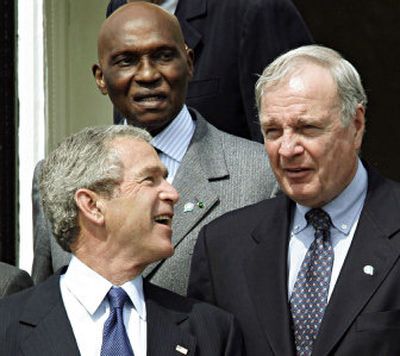G8: Humans cause global warming

AUCHTERARDER, Scotland – Leaders from the world’s top eight industrial nations ended their annual summit Friday by agreeing that humans are a major cause of global warming and pledging to work toward reducing it, but they didn’t commit to any specific actions or timetables.
The Group of Eight also pledged to double financial aid to African nations to $50 billion a year by 2010, forgive the debts of 18 of the world’s poorest nations and provide up to $9 billion over three years to the Palestinian Authority to assist its drive to become an independent state.
The outcome of the gathering of leaders from the United States, Canada, France, Germany, Italy, Japan, Russia and Great Britain fell short of the ambitious agenda that the summit’s host, British Prime Minister Tony Blair, had set, but he hailed it as progress.
“It is the nature of politics that you do not achieve absolutely everything you want to achieve,” Blair said. “But nonetheless, I believe we’ve made very substantial progress indeed.”
Bush administration officials also called the summit a success, especially on climate change.
The G-8 communique, signed by all eight leaders, calls climate change “a serious and long-term challenge that has the potential to affect every part of the globe. We know that the increased need and use of energy from fossil fuels, and other human activities, contribute in large part to increases in greenhouse gases associated with the warming of our Earth’s surface.”
The acknowledgement represents an incremental shift for Bush, who previously has emphasized that the causes behind global warming require further study.
Even so, Bush administration officials moved the other G-8 leaders to accept soft language in the communique that avoids prolonged discussion of the Kyoto Protocol, the 1997 agreement that calls for reducing greenhouse gas emissions to 1990 levels by 2012. Every G-8 nation except the United States has signed that document.
The communique lays out a 10-page “plan of action” that lists pledges to make progress in promoting energy efficiency, conservation and cleaner fuels, but contains no target measures or timetables for progress.
The statement declares that “while uncertainties remain in our understanding of climate science, we know enough to act now to put ourselves on a path to slow and, as science justifies, stop and then reverse the growth of greenhouse gases.”
The G-8 nations will meet again in Canada on Nov. 1 to discuss climate change. Blair said five emerging powers – Brazil, China, India, Mexico and South Africa – had agreed to work together with G-8 to combat global warming.
“On the climate text, we’re very pleased with how that turned out,” said Faryar Shirzad, Bush’s deputy national security adviser for international economic affairs, who led the administration’s preparations for the summit.
Blair said the statement reflected the reality that the United States and the other G-8 nations remained at odds over what to do about global warming and a desire to move beyond the stalemate over the Kyoto Protocol.
“We were never going to be able at this G-8 to resolve the disagreement over Kyoto nor to renegotiate the set of targets for countries in the place of the Kyoto Protocol,” Blair said.
“If it is impossible to bring America into the consensus on tackling the issue of climate change, we will never ensure that the huge emerging economies – particularly those of China and India, who are going to consume more energy than any other part of the world – we will never ensure that they are part of the dialogue. And if we cannot have America as part of the dialogue on climate change, and we can’t have China and India as part of the dialogue, there’s no possibility of us succeeding in resolving this issue.”
Experts in the United States viewed the G-8 statement on climate change as equivocal.
“The document has the kind of political urgency that the Europeans have been saying, but it also kind of lacks the political specifics that say you’ve got to actually do something,” said Lester Lave, a Carnegie Mellon University economics professor and noted energy expert.
“The most striking thing about the G-8 communique is it largely adopts the U.S. position,” said Myron Ebell, a climate change expert at the Competitive Enterprise Institute, a pro-business group that opposes government action on global warming. He called the G-8 agreement a victory for Bush.
“There’s only so long you can continue to admit to a significant problem and not take imminent action on it,” said Tim Profeta, the director of the Nicholas Institute for Environmental Policy Solutions at Duke University.
Turning their attention to Africa, G-8 leaders and other donors pledged to boost international aid to the continent by $25 billion a year by 2010, double the current level, according to British officials.
They said the increase reflected new money, including a last-minute donation from Japan, but Shirzad said it included previously announced commitments.
Blair had hoped for more, but he succeeded in getting G-8 leaders to forgive about $40 billion in debt from 18 of the world’s poorest nations, most of them African. He called the initiatives a start toward solving the continent’s woes.
“It isn’t all that everyone wanted, but it is progress. Real and achievable progress,” he said. “It is the definitive expression of our collective will to act in the face of death and disease and conflict that is preventable.”
African aid advocates were split on the G-8 accomplishments. Rock stars Bono and Bob Geldof, organizers of last Saturday’s Live 8 concerts, called the actions meaningful and welcome.
“This has been the most important summit there ever has been for Africa,” Geldof said. But Kumi Naidoo, the chairman of the Global Call to Action Against Poverty, said the G-8’s initiatives wouldn’t deliver aid fast enough.
“The promise to deliver (aid) by 2010 is like waiting five years before responding to the tsunami,” Naidoo said.